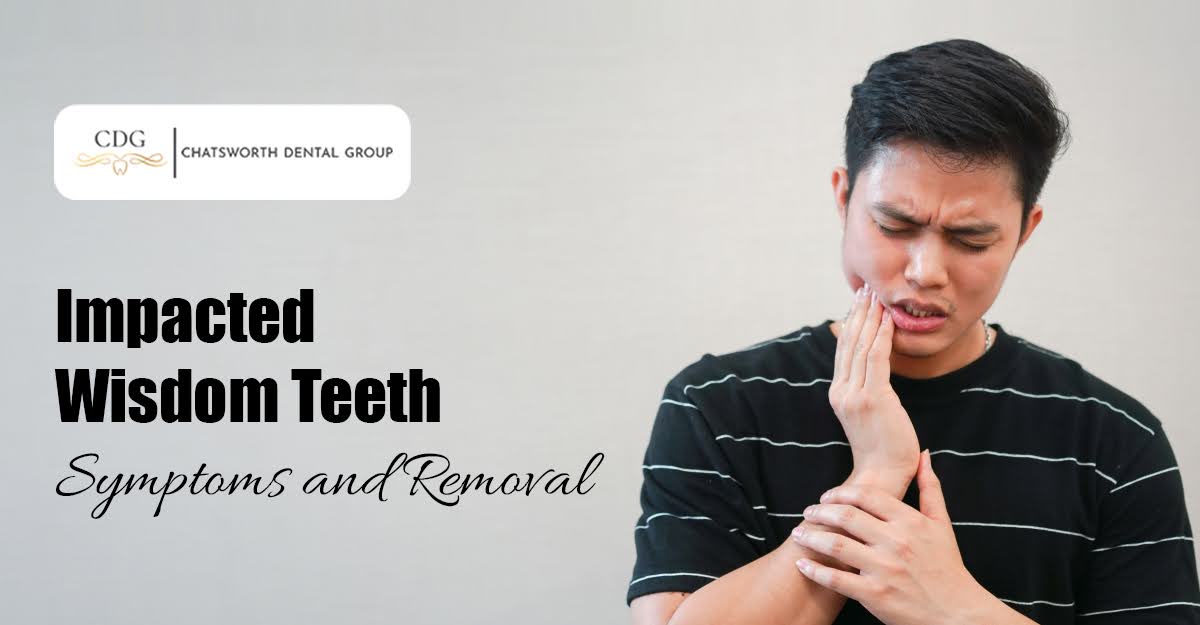
Wisdom teeth are the last set of molars to develop, usually emerging between the ages of 17 and 25. While some people’s wisdom teeth grow in without issue, many others experience impaction, a condition where the teeth are unable to fully emerge due to lack of space or improper alignment. Impacted wisdom teeth can lead to discomfort and other dental issues, making removal a common recommendation. Here’s a closer look at the symptoms associated with impacted wisdom teeth, the reasons for removal, and what you can expect during the procedure.
What Are Impacted Wisdom Teeth?
An impacted wisdom tooth has not fully erupted into the mouth because it is blocked by other teeth or positioned incorrectly. This can result in a partial eruption or complete impaction, where the tooth remains under the gums and cannot emerge at all. Impacted wisdom teeth are often angled or grow sideways, making it difficult for them to align properly with the rest of the teeth.
Symptoms of Impacted Wisdom Teeth
Not all impacted wisdom teeth cause symptoms right away. However, when symptoms do occur, they can range from mild discomfort to more serious dental issues:
- Pain or Discomfort: One of the most common symptoms of impacted wisdom teeth is pain at the back of the mouth or in the jaw. This pain may be intermittent or constant, especially when chewing or touching the area.
- Swelling and Tenderness: Swelling in the gums or around the jaw may occur due to inflammation around the impacted tooth. The gums may also become tender or bleed easily.
- Bad Breath and Unpleasant Taste: Impacted wisdom teeth can trap food and bacteria, leading to bad breath and an unpleasant taste in the mouth.
- Headaches and Jaw Pain: The pressure from an impacted wisdom tooth can lead to jaw stiffness, headaches, and sometimes even neck pain.
- Difficulty Opening the Mouth: In severe cases, impacted wisdom teeth can restrict jaw movement, making it painful or difficult to open the mouth fully.
- Cysts or Infection: Impacted teeth can lead to cysts or pockets of fluid around the area. This increases the risk of infection, which can spread to other parts of the mouth or jaw if left untreated.
Why Remove Impacted Wisdom Teeth?
Dentists often recommend removing impacted wisdom teeth to prevent potential issues such as:
- Infection and Decay: Impacted teeth can become a breeding ground for bacteria, leading to infections and decay that may spread to nearby teeth.
- Crowding and Alignment Issues: When wisdom teeth do not have enough room to grow in properly, they can push against adjacent teeth, potentially causing crowding and misalignment.
- Cysts and Tumors: In rare cases, impacted wisdom teeth can lead to cysts or tumors in the jaw, which may damage the jawbone and surrounding teeth.
- Pain Relief: For those experiencing discomfort, removing impacted wisdom teeth can provide long-lasting relief.
The Wisdom Teeth Removal Procedure
Removing impacted wisdom teeth is a common oral surgery that can be performed by an oral surgeon or a dentist experienced in extractions. Here’s what to expect from the process:
- Initial Consultation: Your dentist or oral surgeon will assess your wisdom teeth through X-rays to determine their position and evaluate any potential risks. They will discuss the procedure with you, along with the type of anesthesia options available.
- Anesthesia: Most wisdom teeth extractions are performed under local anesthesia, although sedation options like IV sedation or general anesthesia may be available for those with severe anxiety or multiple extractions. Additionally, if you feel apprehensive about the procedure, Nitrous oxide (commonly known as laughing gas) can be administered. Nitrous oxide helps you relax during the procedure and can significantly reduce anxiety while keeping you awake and aware, making the experience more comfortable.
- Extraction: During the procedure, an incision is made in the gums if the tooth is fully impacted. The dentist may remove the tooth in sections to minimize bone removal and make extraction easier. Stitches may be used to close the incision once the tooth is removed.
- Recovery: Recovery from wisdom tooth extraction usually takes a few days to a week. Swelling, minor bleeding, and discomfort are common in the first few days. Your dentist will provide aftercare instructions, including pain management, diet recommendations, and tips to minimize swelling and prevent infection.
Recovery Tips
- Rest: Avoid strenuous activities for a few days after surgery to promote healing.
- Cold Compresses: Apply a cold compress periodically for the first 24 hours to reduce swelling and ease discomfort.
- Soft Foods: Stick to soft foods like soups, smoothies, and yogurt for the first few days, avoiding crunchy or spicy foods that could irritate the extraction site.
- Follow Post-Op Instructions: Follow any instructions provided by your dentist, including keeping the mouth clean and avoiding smoking or using straws, which can dislodge blood clots and lead to dry sockets.
When to Seek Professional Help
If you experience prolonged pain, excessive bleeding, or signs of infection like fever or pus after the procedure, contact your dentist promptly for an evaluation. Complications are rare but can occur, and it’s best to address any concerns early on.
For those in Chatsworth, Chatsworth Dental Group offers expertise in wisdom tooth extraction. Our team can assess your specific situation, provide guidance, and ensure a smooth, comfortable procedure. Reach out to us today for more information on managing and treating impacted wisdom teeth to improve your oral health and comfort.

